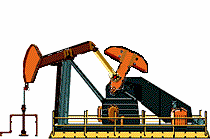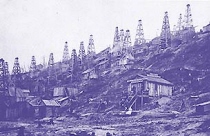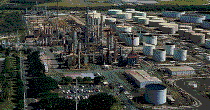| (insert your NIE or newspaper logo here) |
Weekly Online LessonOnline Lesson ArchiveGrade Level: 6-9
|
Pumping Oil
 For many Americans, summer means family road trips to distant destinations.
This summer, though, vacationers may stay closer to home to keep their
wallets from running dry.
For many Americans, summer means family road trips to distant destinations.
This summer, though, vacationers may stay closer to home to keep their
wallets from running dry.
Since late May, drivers across the country have faced record high gasoline prices, with many paying more than $2 per gallon at the pump.
Last week, however, on Tuesday, June 15, 2004, during a Senate hearing, the Energy Information Administration (EIA) announced that gas prices were finally dropping and that it expected the downward trend to continue.
But why did gas prices surge, and what has now caused them to drop? Experts point to a number of factors affecting fuel costs, most of them related to crude oil supply and refinement.
Oil is the lifeblood of America’s economy. Currently, it supplies more than 40 percent of our total energy demands -- from individual consumers to corporate industries -- and more than 99 percent of the fuel we use in our cars and trucks.
Much of this oil is imported into the United States from other countries. Some of those are members of the Organization of Petroleum Exporting Countries (OPEC), which include a number of Arab nations, but also Venezuela and Nigeria. Additional crude comes from non-OPEC nations, including Canada and Mexico. The United States also produces oil, but the amount accounts for only about one-third of our total supply.
The American government is looking to increase domestic oil production in the near future, in order to be less dependent on outside sources. The biggest challenges we face, experts say, is that most of the oil that's the easiest to extract has already been pumped, and that new, more cost-effective methods of extracting what's been left in the ground must be developed.
So for this week's lesson, you'll explore the science of crude oil and how people get it out of the ground. You'll also learn how scientists treat the oil to create usable products, including gasoline, rubber, and plastics.
 Tapping
the Source
Tapping
the Source
Gasoline is made from crude oil, but where does the oil come from? To answer that question, let's uncover the Energy Story of Fossil Fuels at the California Energy Commission. Here, you'll discover the common source of coal, oil (petroleum), and natural gas.
So how exactly, and beginning in what geological era, were these energy sources created? What are some of the differences between the three fossil fuels? What other products, besides gasoline, are made from crude oil?
Next, let's see what it's like Looking Down an Oil Well on a tour at the U.S. Department of Energy.
 Read
the introduction, then Read On to discover how hard
it is Squeezing
Oil Out of Rocks. How exactly does the oil exist underground?
What happens when an oil well strikes a reservoir? How do experts decide
where to drill a well?
Read
the introduction, then Read On to discover how hard
it is Squeezing
Oil Out of Rocks. How exactly does the oil exist underground?
What happens when an oil well strikes a reservoir? How do experts decide
where to drill a well?
As you'll learn, there's plenty of oil left in the ground after primary production, so secondary production takes Washing More Oil from Rocks. How does waterflooding work? For every barrel of oil produced, about how much remains in the ground?
In order to extract even more of the oil, scientists and engineers continue to develop and test new methods, like using Soap, Bugs and Other Ways to Produce Oil. How exactly is carbon dioxide used? What do microbes do that can help extract oil from the ground?
Now that you understand how each oil extraction method works, how do you think the costs of each method compare to one another? How much of it depends upon how the oil deposits exist in the ground?
Pumping Out Products
 Okay,
so you've learned about how we get oil out of the ground, but then how
do we it turn into gasoline and other products?
Okay,
so you've learned about how we get oil out of the ground, but then how
do we it turn into gasoline and other products?
To solve that mystery, visit HowStuffWorks and find out How Oil Refining Works.
After reading the introduction, learn about the crucial components of Crude Oil -- hydrocarbons. What two elements do hydrocarbons contain? How many different classes of hydrocarbons can be found in crude oil?
Next, discover how these different compounds are separated From Crude Oil. Then these products must go through a further Refining Process, which includees Fractional Distillation, Chemical Processing, and Treating and Blending Fractions.
How do scientists take advantage of the natural properties of these compounds to separate them? In what ways do they combine them to create different products?
How does the production, refinement, use of oil, and related environmental impacts compare with other sources of energy and materials?
Newspaper Activities
In current issues of Targetnewspaper look for stories about laws, science and technology, or the economics related to oil or gasoline production. How are politicians and scientists influencing how we obtain or manage our oil supply? How are the costs of oil production, including domestic production and imports from other countries, affecting gasoline prices or other oil-based products? What related activities, such as oil refinement, are changing and why?
© Copyright 2004
Learners
Online,
Inc.
